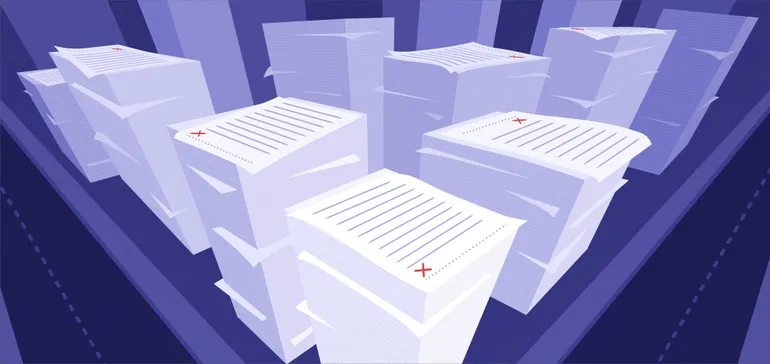This function is part of “The Dotted Line” sequence, which takes an in-depth take a look at the advanced authorized panorama of the development business. To view all the sequence, click on right here.
Contractors are bracing for a contemporary wave of fabric value hikes as President Donald Trump’s new and proposed tariffs gasoline issues throughout the development business.
Comparable insurance policies enacted throughout Trump’s first time period brought on benchmark metal costs to leap 14% earlier than settling at a ten% improve by the tip of 2019. Now, with nonresidential building spending already slipping and materials prices climbing forward of latest tariffs, contractors are as soon as once more weighing how one can shield themselves from sudden value swings.
This time, contractors have a playbook for how one can reply.
Through the peak of the COVID-19 pandemic, building professionals skilled firsthand how value volatility may wreak havoc on budgets. Many pushed for materials escalation clauses in contracts, which permit for changes in pricing as a result of market volatility.
Regardless of preliminary resistance, the pandemic pushed some house owners to in the end settle for these provisions, setting a precedent contractors could try and construct upon within the coming years, mentioned Matthew Lengthy, building accomplice at Cohen Seglias, a Philadelphia-based legislation agency.

Matthew Lengthy
Courtesy of Cohen Seglias
“Materials value improve phrases turned extra widespread throughout the first Trump administration, and have been ubiquitous throughout the pandemic,” mentioned Lengthy. “Throughout that point, house owners have been typically compelled to just accept these phrases. Contractors have continued to request materials value escalation phrases in recent times, with much less success.”
Lengthy mentioned he anticipates a resurgence in materials value escalation phrases throughout the second Trump administration. In reality, many business normal contracts, equivalent to these from ConsensusDocs, now embrace addendums for materials value escalation, mentioned Zack Rippeon, a accomplice within the Atlanta workplace of legislation agency Smith Currie Oles.
“The phrase ‘tariff’ most likely doesn’t exist in any normal type contracts,” mentioned Rippeon. “However the idea of fabric escalation is completely one thing that’s mentioned and negotiated.”
A query of time and money
David Suchar, a accomplice at Maslon, a Minneapolis-based legislation agency, famous whereas normal business contracts typically don’t tackle tariffs, contractors can nonetheless shield themselves.
“Development contracts can tackle points related to tariffs” through escalation provisions, mentioned Suchar. “They might sometimes enable contractors to hunt extra compensation if tariffs trigger will increase in prices for sure mission supplies.”
Nonetheless, Rippeon added that tariffs, past driving up prices, additionally prolong mission timelines by delaying materials deliveries. If a contractor is ready on foreign-sourced supplies that are actually topic to tariffs, they might face schedule overruns.
“It’s not simply concerning the cash — even when I pays extra or have an avenue to have any person reimburse me that cash, how for much longer is it now going to take me to get that materials?” mentioned Rippeon. “So, I believe the protections for contractors have to deal with each, not simply on the associated fee affect of tariffs, but in addition the associated fee on time affect.”
Different helpful clauses
One other widespread strategy to mitigating the results of tariffs is to make use of change-in-law clauses, mentioned James Doerfler, accomplice within the mission and building group at Reed Smith, a Pittsburgh-based legislation agency.

James Doerfler
Permission granted by Reed Smith
“In the event you’re a contractor and also you had a brand new tariff that was enacted after the contract was applied, you’d look to your contract to see whether or not or not the tariff would qualify as a change-in-law,” mentioned Doerfler. “Equally, you’d take a look at the pressure majeure provision to see whether or not or not it matches as a means of justifying a change order.”
Drive majeure clauses cowl unexpected occasions that make efficiency unattainable or excessively pricey. Some contractors could argue that tariffs meet this threshold, however whether or not a courtroom or proprietor will agree is a separate matter, mentioned Monica Dozier, accomplice at Bradley, a Birmingham, Alabama-based legislation agency.
“Tariffs are typically thought-about import taxes,” mentioned Dozier. “Contractors ought to pay shut consideration to contract phrases relating to tax accountability, modifications in legislation and even pressure majeure occasions to grasp their potential rights and cures within the occasion of a change in tariffs.”
Suchar warned in opposition to relying too closely on pressure majeure clauses, as they’re sometimes restricted in scope and infrequently solely present schedule aid, fairly than extra compensation.
“Events typically flip to pressure majeure clauses for price will increase after the very fact however this isn’t a most well-liked route,” mentioned Suchar. “It’s simpler to explain the potential concern and take care of it particularly. Drive majeure clauses additionally typically enable just for extensions of time and never extra compensation.”
The obvious resolution — writing tariff-related clauses into contracts — is a tricky promote, mentioned Rippeon. Homeowners have traditionally rejected these provisions, arguing they introduce price uncertainty and threat to their budgets, mentioned William Thomas, a building legal professional at St. Louis-based legislation agency Gausnell, O’Keefe & Thomas and chair of the Worldwide Affiliation of Protection Counsel’s building legislation and litigation committee.
Even when a contractor insists on a tariff-related safety clause, house owners could merely select one other bid with out one. All these clauses would additionally typically require contractors to construct in a lot of a value cushion they might now not be the decrease bidder, mentioned Andrew Richards, co-chair of the development apply group at Kaufman Dolowich, a Woodbury, New York-based legislation agency.
What sort of contract is finest?
Contracts with contingencies and allowances enable for changes in materials pricing, mentioned Colm Nelson, chair of the true property business group at Stoel Rives, a Portland, Oregon-based legislation agency.
“Lots of building contracts are assured most value contracts. In these contracts, the contractor is paid primarily based on price, plus its price, plus a contingency as much as a assured most value,” mentioned Nelson. “So, one query is, ‘What’s the contingency for, and may it’s used for sudden will increase in tariffs?’ Use of contingency is some extent of negotiation.”
Nelson additionally famous that allowances could be one other instrument to handle tariff-related price fluctuations. If supplies fall below an allowance, the contract value can transfer up or down primarily based on real-time price modifications.
“If there’s an merchandise, like a cloth in an allowance bucket, the contract value will go up and down relying on how a lot that value strikes,” mentioned Nelson. “It’s a option to give the contractor some room below the assured most value contract, however not completely threat free.”
Dozier agrees tasks utilizing cost-plus or assured most value constructions enable for price changes below sure circumstances. The Related Common Contractors of America recommends utilizing cost-plus agreements in mild of tariff uncertainty.
“Lately, many contractors have began negotiating specific change order aid for modifications in tariffs in building contracts,” mentioned Dozier. “Others have proposed incorporating value escalation rights tied to publicly-available commodities indices, and even open-book cost-plus procurement pricing phrases.”

Stacy Bercun Bohm
Permission granted by Akerman
In contrast, lump-sum contracts, which set a fixed-price settlement for a mission, depart contractors extra uncovered to materials value volatility as a result of they provide fewer avenues for price changes, mentioned Dozier. Stacy Bercun Bohm, building apply co-chair at Akerman, famous specificity in contract language performs a key function in managing tariff-related dangers, significantly in lump-sum agreements the place house owners goal to take care of mounted pricing constructions.
“Higher specificity in value escalation clauses is healthier for contract interpretation,” mentioned Bercun Bohm. “For instance, when the idea of fee is a lump sum, house owners want to explain the contract value as agency and never topic to will increase for escalation, together with tariffs.”
Different risk-sharing approaches
Some contractors, particularly on large-scale tasks, are pushing for various approaches. That features house owners experimenting with methods to distribute threat.
First, as a substitute of awarding huge turnkey contracts, house owners are splitting them into a number of jobs. That reduces monetary publicity for anyone celebration, mentioned Doerfler.
“Homeowners are breaking apart these very giant tasks into smaller items the place they’re phasing it, dividing up the accountability,” mentioned Doerfler. “I might count on that the prospect of tariffs goes to additional speed up that development.”
One other technique entails risk-sharing agreements between contractors and house owners to mitigate price will increase, mentioned Rippeon. As an alternative of 1 celebration bearing the complete brunt of rising materials costs, house owners could cowl the primary 5% to 10% of price overruns, with contractors chargeable for something past that.
“Let’s agree that the primary X p.c of fabric price overruns the proprietor will bear, after which the contractor eats the remaining,” mentioned Rippeon. “So, if metal goes up 20%, and the proprietor agrees to eat the primary 5% to 10%, that offers the contractor some reassurance that they’re not going to need to eat all of it.”

John Neary
Permission granted by Akerman
Danger allocation for tariffs is usually negotiated between mission stakeholders, with varied methods obtainable to deal with potential price will increase. The extent to which contracts can shift these dangers onto house owners relies upon largely on contract phrases and the leverage every celebration has in negotiations, mentioned John Neary, building apply co-chair at legislation agency Akerman.
“The chance allocation for tariffs is all a part of the contract negotiation course of between mission stakeholders, and there are a lot of methods events can tackle this threat level of their contracts,” mentioned Neary. “Contractors can completely be on the hook for value escalation attributable to tariffs.”







